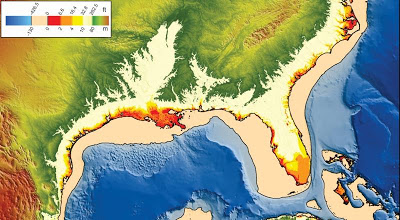

| Visitors Now: | |
| Total Visits: | |
| Total Stories: |

| Story Views | |
| Now: | |
| Last Hour: | |
| Last 24 Hours: | |
| Total: | |
Global Warming: “Why Seas are Rising Ahead of Predictions”
by ScienceDaily
Sea levels are rising faster than expected from global warming, and University of Colorado geologist Bill Hay has a good idea why. The last official IPCC report in 2007 projected a global sea level rise between 0.2 and 0.5 meters by the year 2100. But current sea-level rise measurements meet or exceed the high end of that range and suggest a rise of one meter or more by the end of the century. “What’s missing from the models used to forecast sea-level rise are critical feedbacks that speed everything up,” says Hay. He will be presenting some of these feedbacks in a talk on Nov. 4, at the meeting of The Geological Society of America in Charlotte, North Carolina, USA.
One of those feedbacks involves Arctic sea ice, another the Greenland ice cap, and another soil moisture and groundwater mining. “There is an Arctic sea ice connection,” says Hay, despite the fact that melting sea ice – which is already in the ocean – does not itself raise sea level. Instead, it plays a role in the overall warming of the Arctic, which leads to ice losses in nearby Greenland and northern Canada. When sea ice melts, Hay explains, there is an oceanographic effect of releasing more fresh water from the Arctic, which is then replaced by inflows of brinier, warmer water from the south. “So it’s a big heat pump that brings heat to the Arctic,” says Hay. “That’s not in any of the models.” That warmer water pushes the Arctic toward more ice-free waters, which absorb sunlight rather than reflect it back into space like sea ice does. The more open water there is, the more heat is trapped in the Arctic waters, and the warmer things can get.
Then there are those gigantic stores of ice in Greenland and Antarctica. During the last interglacial period, sea level rose 10 meters due to the melting of all that ice – without any help from humans. New data suggests that the sea-level rise in the oceans took place over a few centuries, according to Hay. “You can lose most of the Greenland ice cap in a few hundred years, not thousands, just under natural conditions,” says Hay. “There’s no telling how fast it can go with this spike of carbon dioxide we are adding to the atmosphere.”
This possibility was brought home this last summer as Greenland underwent a stunning, record-setting melt. The ice streams, lubricated by water at their base, are speeding up. Hay notes, “Ten years ago we didn’t know much about water under the Antarctic ice cap.” But it is there, and it allows the ice to move – in some places even uphill due to the weight of the ice above it. “It’s being squeezed like toothpaste out of a tube,” explains Hay. The one thing that’s holding all that ice back from emptying into the sea is the grounded ice shelves acting like plugs on bottles at the ends of the coastal glaciers. “Nobody has any idea how fast that ice will flow into the oceans once the ice shelves are gone.” Another missing feedback is the groundwater being mined all over the world to mitigate droughts. That water is ultimately added to the oceans (a recent visualization of this effect in the U.S. was posted by NASA’s Earth Observatory.
All of these are positive feedbacks speeding up the changes in climate and sea-level rise. “You would expect negative feedbacks to creep in at some point,” says Hay. “But in climate change, every feedback seems to go positive.” The reason is that Earth’s climate seems to have certain stable states. Between those states things are unstable and can change quickly. “Under human prodding, the system wants to go into a new climate state.”
2012-11-05 21:24:48
Source: http://coyoteprime-runningcauseicantfly.blogspot.com/2012/11/global-warming-why-seas-are-rising.html
Source:



